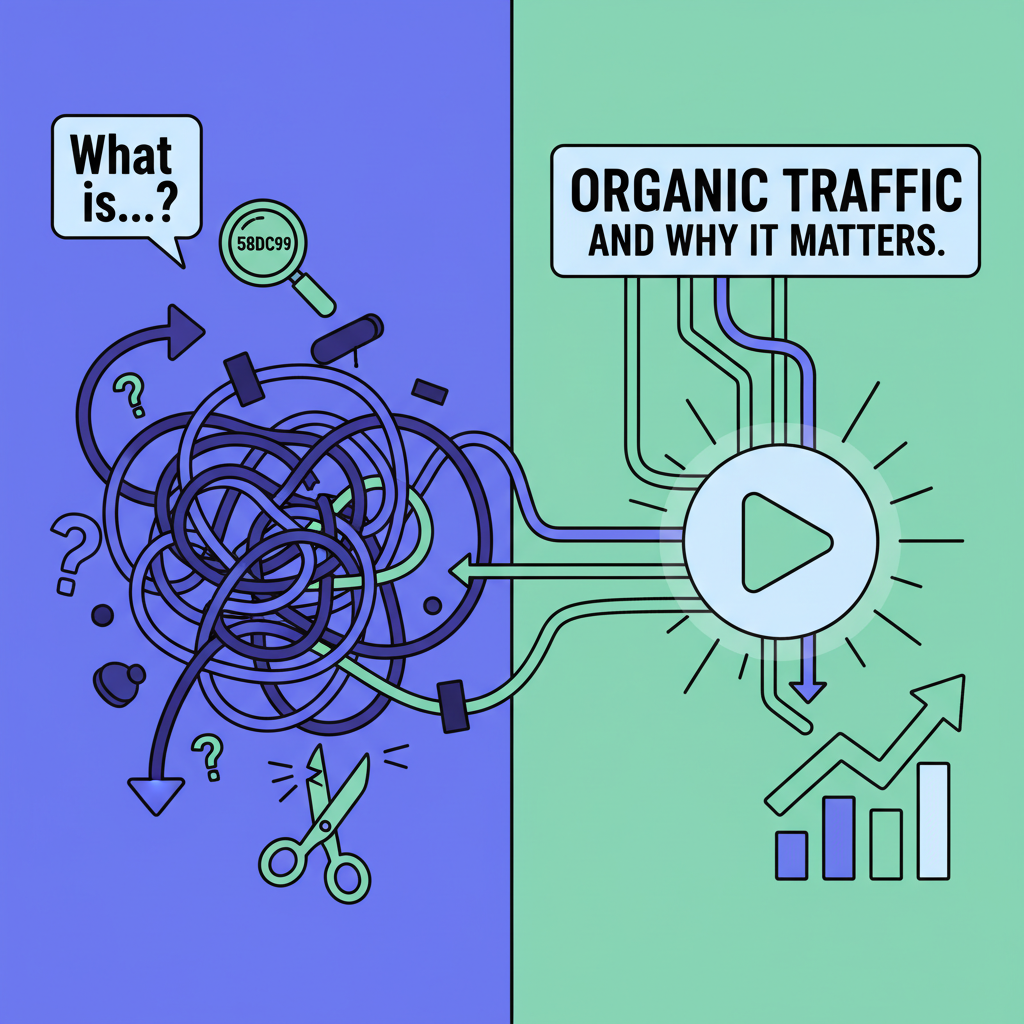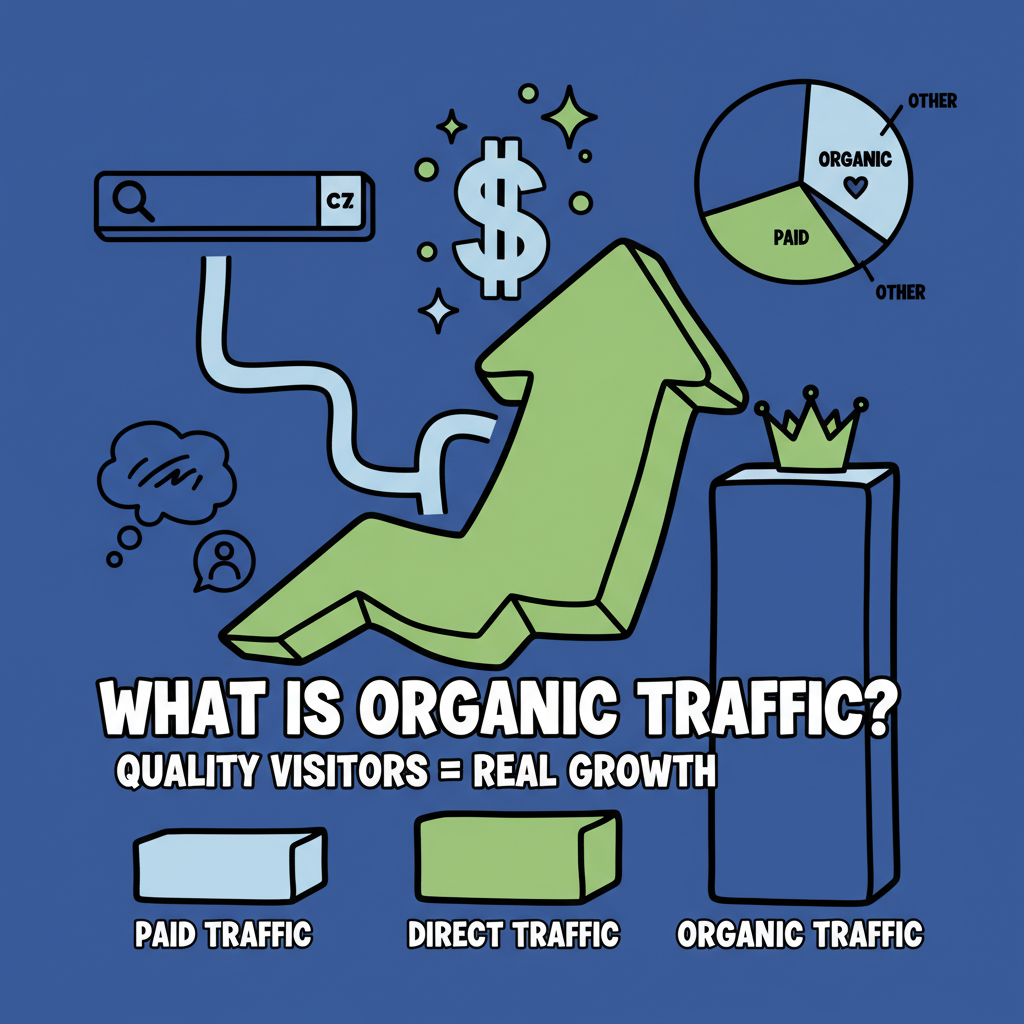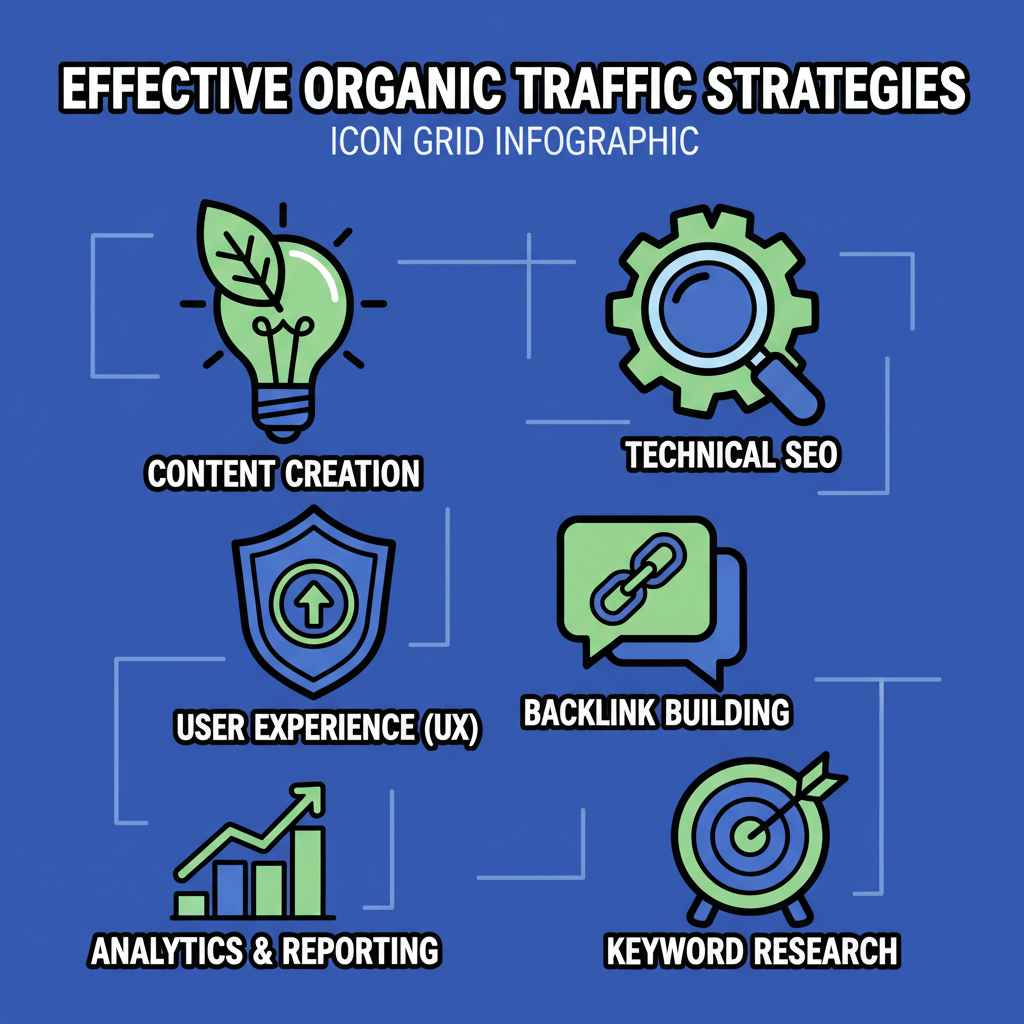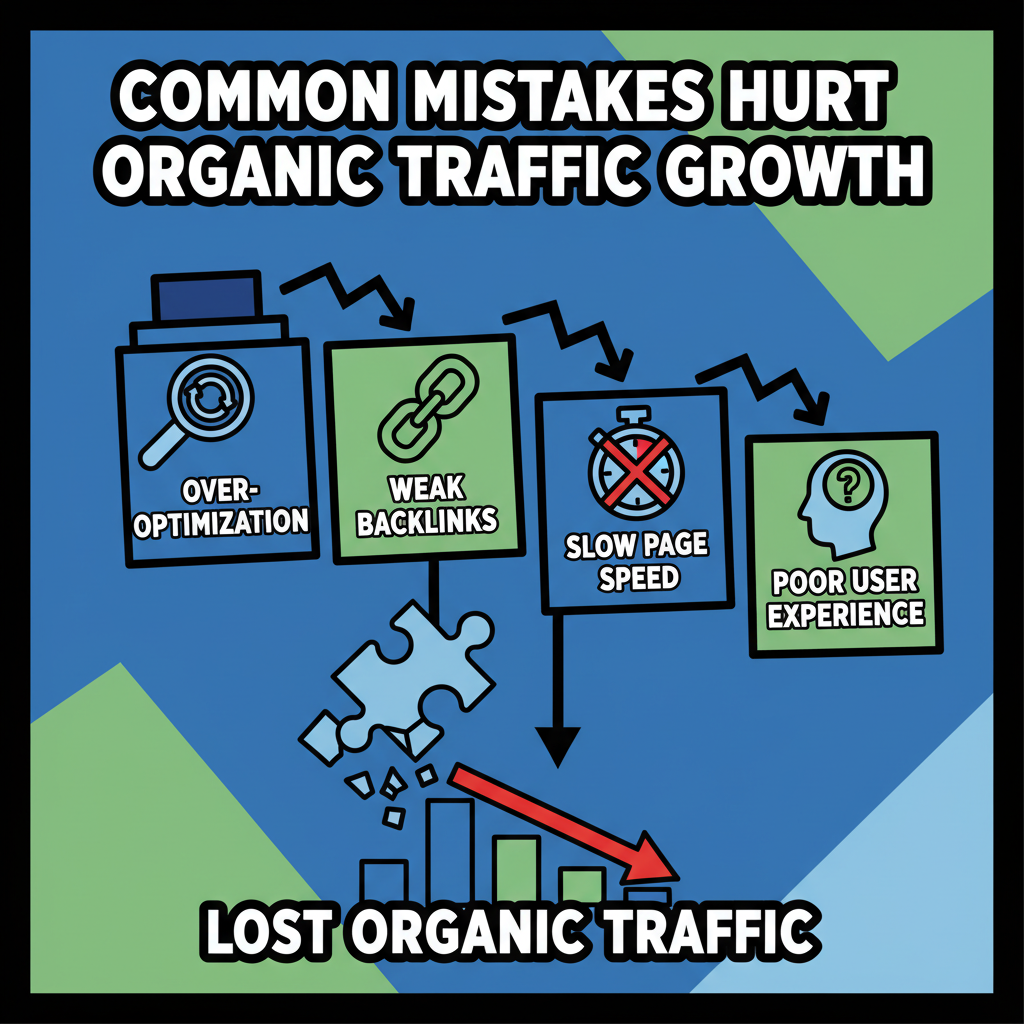What is Organic Traffic and Why Does it Matter?
Posted by
Related reading
What Does SEO Automated Actually Mean?
How to Implement SEO Automated Solutions That Actually Drive Results Implementing automated SEO can transform your digital marketing strategy, but only when don...
The Complete Guide to Building a Successful Blog Post Website in 2026
The Complete Guide to Building a Successful Blog Post Website in 2026 Creating a blog post website has become one of the most powerful ways to establish an onli...
What Exactly Is Keyword Research in SEO?
What Makes Keyword Research in SEO Different from General Keyword Research? When most people think about keyword research, they picture brainstorming popular se...
The Complete Guide to Organic Traffic: Strategies That Drive Real Results

Understanding how to attract visitors naturally through search engines can transform your online presence. Organic traffic represents the foundation of sustainable digital growth, bringing qualified visitors who are actively searching for what you offer. In this comprehensive guide, you'll discover proven strategies to increase your organic reach, understand the metrics that matter, and implement tactics that deliver measurable results for your website.
What is Organic Traffic and Why Does it Matter?

Organic traffic refers to visitors who find your website through unpaid search engine results. Unlike paid advertising, these visitors discover your content naturally when searching for relevant topics, products, or services. This type of traffic holds exceptional value because it indicates genuine interest and intent from your audience.
The significance of organic traffic extends beyond simple visitor numbers. These users typically demonstrate higher engagement rates, longer session durations, and better conversion potential compared to other traffic sources. When someone finds your website through a search query, they're already expressing interest in your topic area, making them more likely to engage with your content meaningfully.
According to BrightEdge's research on organic search, organic search drives over 50% of all website traffic across industries. This statistic underscores the critical importance of developing a robust organic traffic strategy for long-term business success.
How Do Search Engines Determine Organic Rankings?
Search engines use complex algorithms to evaluate and rank web pages based on numerous factors. Understanding these ranking signals helps you optimize your content effectively and improve your organic visibility.
Content quality serves as the primary ranking factor. Search engines analyze how well your content answers user queries, its depth of coverage, and its uniqueness compared to existing content. Pages that provide comprehensive, accurate, and valuable information typically achieve higher rankings in search results.
Technical factors also play crucial roles in organic rankings. Page loading speed, mobile responsiveness, secure connections (HTTPS), and proper site structure all influence how search engines evaluate your website. Google's Core Web Vitals specifically measure user experience metrics that directly impact organic performance.
Understanding User Intent and Content Alignment
Search engines prioritize content that matches user intent behind specific queries. This means understanding whether someone is looking for information, trying to make a purchase, or seeking a particular website. Creating content that aligns with these different intent types significantly improves your organic traffic potential.
When developing content strategies, consider the four main types of search intent: informational (learning something), navigational (finding a specific site), commercial (researching before buying), and transactional (ready to purchase). Tailoring your content to match these intent patterns helps search engines connect your pages with the right audience.
What Are the Most Effective Organic Traffic Strategies?

Building sustainable organic traffic requires a multi-faceted approach that combines content excellence with technical optimization. The most successful strategies focus on creating value for users while making it easy for search engines to understand and rank your content.
Content creation forms the cornerstone of effective organic traffic generation. High-quality, original content that addresses real user needs and questions naturally attracts both search engines and visitors. Focus on topics where you can provide unique insights, comprehensive coverage, or fresh perspectives that differentiate your content from competitors.
Keyword research and implementation guide your content strategy toward topics that people actively search for. However, modern SEO requires moving beyond simple keyword stuffing toward natural integration of relevant terms and phrases. Creating intent-based blog posts ensures your content matches what users actually want to find.
Technical SEO Foundations
Technical optimization creates the framework that allows your content to perform effectively in search results. This includes optimizing site speed, ensuring mobile compatibility, creating clear site architecture, and implementing proper schema markup to help search engines understand your content context.
Regular technical audits identify and resolve issues that might prevent search engines from properly crawling and indexing your pages. Common technical problems include broken links, duplicate content, missing meta tags, and slow loading times that can significantly impact your organic traffic potential.
How to Measure and Track Organic Traffic Success?
Measuring organic traffic performance requires monitoring multiple metrics that provide insights into both quantity and quality of your search engine visitors. Understanding these metrics helps you identify what's working and where improvements are needed.
Google Analytics provides comprehensive organic traffic data, including visitor numbers, source keywords, page performance, and user behavior patterns. Pay particular attention to organic sessions, bounce rates, average session duration, and conversion rates from organic traffic sources.
Search Console offers additional insights specifically focused on search performance, including impressions, click-through rates, average position, and query data. This tool helps you understand how your content appears in search results and identify opportunities for improvement.
| Metric | What It Measures | Why It Matters |
|---|---|---|
| Organic Sessions | Total visits from search engines | Overall traffic volume |
| Click-Through Rate | Percentage who click from search results | Title and description effectiveness |
| Average Position | Where you rank for target keywords | Visibility in search results |
| Bounce Rate | Visitors who leave after one page | Content relevance and quality |
| Conversion Rate | Visitors who complete desired actions | Business impact of organic traffic |
What Common Mistakes Hurt Organic Traffic Growth?

Many websites unknowingly implement practices that hinder their organic traffic potential. Recognizing and avoiding these common mistakes can significantly improve your search engine performance and visitor growth.
Over-optimization represents one of the most frequent issues affecting organic traffic. This includes keyword stuffing, excessive internal linking, or creating content primarily for search engines rather than users. Modern search algorithms prioritize natural, user-focused content over content that appears manipulative or artificial.
Neglecting mobile optimization severely limits organic traffic potential, as mobile searches now represent the majority of all search queries. Websites that don't provide excellent mobile experiences typically see reduced rankings and lower organic traffic volumes.
Content Quality and Consistency Issues
Inconsistent publishing schedules and poor content quality create barriers to organic traffic growth. Search engines favor websites that regularly publish valuable content and demonstrate expertise in their topic areas. Sporadic posting or low-quality content signals to search engines that your site may not be a reliable resource for users.
Duplicate or thin content also hampers organic traffic performance. Pages with minimal unique value or content that closely mirrors existing pages struggle to achieve meaningful search rankings. Focus on creating substantial, original content that provides genuine value to your target audience.
How to Scale Your Organic Traffic Strategy?
Scaling organic traffic requires systematic approaches that can grow with your business while maintaining quality standards. The most effective scaling strategies focus on creating repeatable processes and leveraging data-driven insights to guide expansion efforts.
Content cluster strategies allow you to systematically cover topic areas comprehensively. By creating pillar content around main topics and supporting articles that cover related subtopics, you can establish topical authority and capture traffic for numerous related keywords within your niche.
According to HubSpot's marketing statistics, companies that publish 16 or more blog posts per month get 3.5 times more traffic than companies publishing four or fewer posts. This data highlights the importance of consistent, scaled content production for organic traffic growth.
Automation and Efficiency Tools
Leveraging SEO tools and automation can help you scale your organic traffic efforts without proportionally increasing manual work. Tools for keyword research, content optimization, technical auditing, and performance tracking enable you to manage larger content volumes while maintaining quality standards.
Content templates and editorial calendars streamline the production process, ensuring consistent quality while enabling team members to contribute effectively. Establishing clear guidelines for content creation, optimization, and promotion helps maintain standards as you scale your organic traffic initiatives.
What Does the Future Hold for Organic Traffic?
The organic traffic landscape continues evolving with advancing search technologies and changing user behaviors. Understanding these trends helps you prepare strategies that remain effective as search engines and user expectations develop.
Artificial intelligence increasingly influences how search engines understand and rank content. This shift emphasizes the importance of creating genuinely helpful, comprehensive content rather than content optimized primarily for traditional ranking factors. Search engines are becoming better at identifying content that truly serves user needs.
Voice search and mobile-first indexing represent significant shifts in how people discover content organically. Optimizing for conversational queries and ensuring excellent mobile experiences become increasingly critical for maintaining and growing organic traffic in the coming years.
Conclusion
Organic traffic represents the most sustainable and valuable source of website visitors, providing long-term growth potential that compounds over time. By focusing on creating exceptional content, optimizing technical foundations, and understanding user intent, you can build an organic traffic strategy that delivers consistent results.
Success with organic traffic requires patience, consistency, and a genuine commitment to serving your audience's needs. The strategies outlined in this guide provide a comprehensive framework for building and scaling your organic presence effectively.
Ready to transform your organic traffic results? Fast SEO Fix specializes in helping websites achieve sustainable organic growth through proven strategies and automated optimization tools. Start implementing these techniques today and watch your organic traffic flourish.

Stefan Winter
Founder & SEO Expert
Founder of Fast SEO Fix and SEO automation expert. Stefan built Fast SEO Fix to solve the tedious problem of manual SEO work. He specializes in SEO optimized content generation, keyword research, and automated SEO strategies.